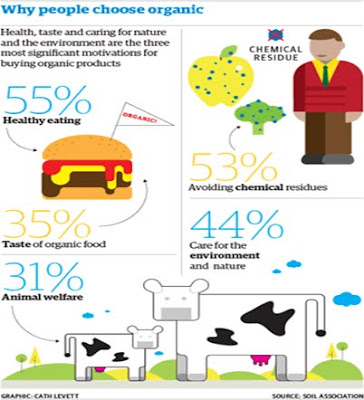Organic Food
DIFFERENCE BETWEEN ORGANIC AND NON ORGANIC FOODS
Prime Minister Narendra Modi officially announced during inaugurating the Sikkim Organic Festival 2016 in Gangtok Sikkim. Sikkim is now the first fully organic state of India. Sikkim known as the Land of Flower will now be also known as first organic state too.
“Organic foods are defined ...as those foods that are grown without the use of synthetic fertilizers, sewage sludge, irradiation, genetic engineering, pesticides, or drugs. Pesticides are chemical or control agents made to kill insects, weeds, and fungal pests that damage crops.”
Non-organic foods, refers to the either directly manufactured with or are indirectly contaminated by synthetic fertilizers, sewage sludge, irradiation, genetic engineering, pesticides or drugs, chemicals etc...
The World Health Organization estimates that there are 3 million cases of pesticide poison in each year and up to 220,000 deaths, primarily in developing countries. The potential health effects of pesticides include asthma, allergies, and hypersensitivity, and pesticide exposure is also linked with cancer, hormone disruption, and problems with reproduction and fetal development. Children are at greater risk from exposure to pesticides because of their small size: relative to their size, children eat, drink, and breathe more than adults.
Because of modern landscaping and farming practices, pesticides are so invasive that virtually no one is safe from them. How many of the above health conditions can be directly caused by eating non-organic food? No one knows.
We must be cautious when we shop for our groceries as these harmful pesticides can be hidden ingredients. As a consumer who is concerned with natural health and disease reversal, it is important to educate yourself on what you and your family are eating.
.
Organic food in India was well regarded always, valued as well as cultivated with optimum understanding of the sustainability of the planet, the bio-network as well as the future generation. However, over the last few decades, the stature of Indian agriculture has changed to a wide extent. Food items available today in the market are mostly laden with chemical fertilizers and pesticides which are used mostly for achieving early as well as huge produce. On the contrary use of these chemical fertilizers has enhanced the production and rate of productivity to a higher extent. Increase in the use of pesticides has also given birth to a large number of environmental and health related problems. Chemical fertilizers and pesticides upon use over a long time span results in adverse toxic effects upon the land’s productivity and further transfers diseases to the consumers having these products.
Organic food in India is cultivated by the use of organic manures, bio- pesticides and bio- fertilizers. Due to the health benefits that organic products come with, these are being highly preferred by both producers and consumers.
Higher use of organic food
Increasing awareness with regard to tasty, nutritious, healthy food and the changing lifestyle today are boosting the demand for farm products. This is mostly seen in metropolitan cities and majority of this demand has been created by cities such as Mumbai, Delhi, Chennai, Pune, Gurgaon and Bengaluru. Consumers are opting for organic food in India very consciously to rectify their eating habits. This in a way is driving the budding entrepreneurs in dealing with organic food products. According to the study that has been recently prepared, size of Indian organic food market in 2014 was worth $0.36billion and it was organic food grains and pulses that formed the majority of the market share. The research also reports that by the end of 2020, the organic food product market in India will witness growth by 25%, provided there is growing awareness regarding these products on part of the government.
Increasing awareness with regard to tasty, nutritious, healthy food and the changing lifestyle today are boosting the demand for farm products. This is mostly seen in metropolitan cities and majority of this demand has been created by cities such as Mumbai, Delhi, Chennai, Pune, Gurgaon and Bengaluru. Consumers are opting for organic food in India very consciously to rectify their eating habits. This in a way is driving the budding entrepreneurs in dealing with organic food products. According to the study that has been recently prepared, size of Indian organic food market in 2014 was worth $0.36billion and it was organic food grains and pulses that formed the majority of the market share. The research also reports that by the end of 2020, the organic food product market in India will witness growth by 25%, provided there is growing awareness regarding these products on part of the government.
· Benefits of having organic food:-
Possess adequate nutrients and antioxidants- Organic food in India are enriched with adequate amount of nutrients and anti-oxidants that are beneficial for health. Also, those who are prone to allergies caused as a result of excessive use of food preservatives or other chemicals will grab control over such symptoms with the use of organic food in their day to day life. Due to less usage of pesticides, these organic items are considered healthy.
Possess adequate nutrients and antioxidants- Organic food in India are enriched with adequate amount of nutrients and anti-oxidants that are beneficial for health. Also, those who are prone to allergies caused as a result of excessive use of food preservatives or other chemicals will grab control over such symptoms with the use of organic food in their day to day life. Due to less usage of pesticides, these organic items are considered healthy.
· Free from genetically modified produce or organisms- Food produced organically are fresh as they are devoid of harmful preservatives. On addition, they are also free from genetically modified produce or organisms. Such plants or animals have their DND completely altered in a manner which is not possible in case of traditional crossbreeding. GMOs are basically engineered for making the food produce completely resistant to the herbicides. It is good for the environment as organic farming has cut down the intensity of pollution and also tends to conserve the use of energy, water and soil erosion. As a result, soil fertility is enhanced.
· No Chemicals in Your Daily Diet: Pesticides are chemicals designed to kill living organisms and are harmful for humans. Organic farming makes sure you have no chemicals in your daily diet.
· Tastes Great: Well-balanced soil grows strong and healthy crops that are wholesome and contain the required nutrient in the right proportions. Hence they taste great and are more nutritious.
· Reduce Health Risks: Research has linked many approved pesticides with cancer and other diseases. Organic agriculture is the only way to keep them from getting into our body thus reducing health risks.
· Our Tomorrow Our Children: Children are four times more susceptible than adults to cancer causing pesticides in food. Give them a wholesome life with organic.
· Protect The Earth: We lose billions of tons of topsoil due to conventional agricultural practices. Organic farming brings back the health of the soil.
· Prevent Water Contamination: Pesticides and chemo-synthetic fertilizers used in conventional farming are estimated to pollute the primary sources of drinking water to 60-70% of the country’s population. Organic farming prevents water contamination.
· Preserve Diversity: Loss of large variety of species (biodiversity) is a result of one crop being produced on the same soil year after year. Organic farming counteracts the loss
· Help The Small Farmers: Organic farming can be a lifeline for small farmers because it offers an alternative market where he can get a fair price.
· Every food purchase supports the system that delivers it, and if large-scale chemical production methods are damaging to the environment, then purchasing these foods supports this damage. A main goal of organic farming is minimizing impact to the environment.
· The average non organic fruit contains more than 20 pesticides.
· Organic food is richer in vitamins, minerals and fibre and retains the levels of nutrients for much longer.
· Your body will be more resistant to disease as it will have higher levels of the essential nutrients it needs to fight off infection.
The best example is that Gujrat’s first woman Chief Minister Anandiben Patel Who takes Chief Minister Seat after Narendra Modi hobbies is Organic Gardening. She grows organic fruit and organic vegetable in her Government Bungalow garden. She also regularly sent these Organic Fruit and Organic Vegetables for her Son Sanjay Patel and Daughter Anar Patel.
My Recommendation:-
So, if you are still thinking whether it would be safe to go with organic food in India or not, the answer is definitely yes.
So, if you are still thinking whether it would be safe to go with organic food in India or not, the answer is definitely yes.


Comments
Post a Comment